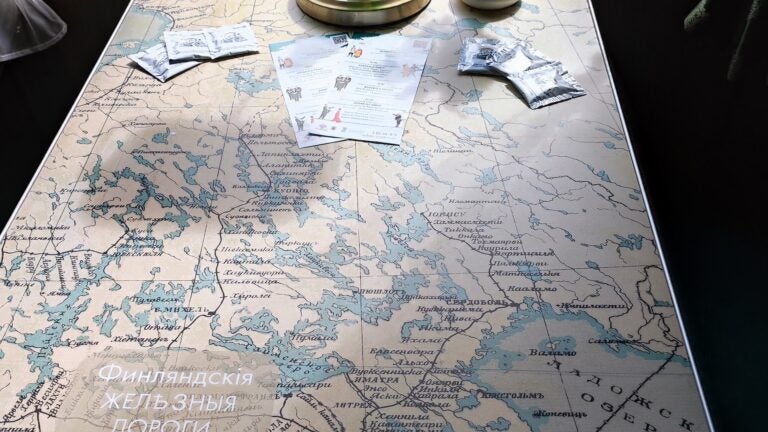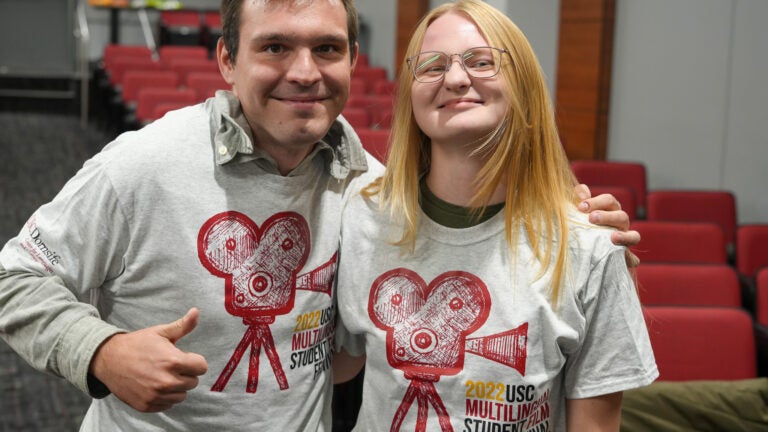Russian Language
Upon finishing a major in Russian, non-native speakers will be able to participate actively in most informal and some formal conversations; to handle the linguistic challenges presented by an unexpected turn of events in the context of a routine situation; to provide a short, structured argument in support of an opinion; and to read and discuss authentic contemporary texts dealing with topics in Russian culture, politics, and society.
Heritage speakers will be able to accomplish all of the objectives listed above. They will also be able to explain an opinion in detail and construct narratives in literate Russian, both orally and in writing.
A marked degree of fluency in the language of other cultures is an essential tool to developing an in-depth understanding of them. The ability to speak, listen, read, and write in other languages therefore is an imperative for students to have in this global age.
Cultural Knowledge
All students completing the Russian major will be able to differentiate and appraise the major periods in Russian cultural history (medieval Russia, Petrine Russia, Imperial Russia, Soviet Russia, post-Soviet Russia). They will be able to evaluate critically important texts from each period and to assess key theories of Russian cultural identity and interpretive controversies in the history of Russian culture.
Although the Russian major no longer concentrates exclusively on literature, we nonetheless expect our students to be able to analyze literary and historical texts (in Russian and in translation); to distinguish key periods and issues in Russian literary history (especially from the nineteenth century onward); and to have read a select list of works in the original Russian.

Intellectual Achievement
We expect the very best of our students also to be able to produce extended discourse in Russian in which they provide structured arguments in support of their opinions. They will also be on their way toward consolidating their knowledge, not just of selected literary and other (historical, political, cultural) works in Russian, but of a representative bibliography of such works. The linguistic and cultural knowledge at this level is such that they would be well-prepared to enter graduate study in the field or use their knowledge in a professional setting (e.g., business, journalism) without extensive further training.
Russian Major Requirements
Students are required to study four semesters of Russian language as a prerequisite to the major. The major itself requires an additional three semesters of language study, three semesters of an advanced seminar on Russian culture (with varying content), and two elective courses, either in Russian literature and culture (in translation or Russian, depending on course scheduling) or in Russian area studies.
Requirements for the Bachelor of Arts in Russian
Note: all courses are 4 units.
Lower division:
RUSS 120 Beginning Russian I
RUSS 150 Beginning Russian II
RUSS 220 Intermediate Russia I
RUSS 250 Intermediate Russian II
Upper division:
RUSS 310 Advanced Russian in Popular Culture: conversation, reading, grammar and topical analysis of Russian press, films and other popular sources. Conducted in Russian.
SLL 321 or SLL 330g
SLL 321 Russian Culture: survey of Russian civilization from the beginnings to the Soviet period focusing on major cultural and artistic trends.
SLL 330g Russian Thought and Civilization: Russian cultural identity from its beginnings until today. The Eastern Orthodox tradition, its traumatic confrontation with Western culture, and their continuous interaction.
SLL 340 Intercultural Communication in Russian: Advanced language training focusing on specific issues of communication with Russians. Analysis and translation of literary texts. Advanced syntax. Conducted in Russian.
SLL 465 Seminar in Russian Studies: Readings and discussion in Russian of current topics in Russian culture, politics and society. Content varies each time offered. (May be taken three times with varying content; 12 max units)
In addition, two elective courses are required that must be approved by the undergraduate advisor. For majors with a concentration in Russian language, literature and culture, these electives will be from Slavic Department courses on Russian literature and culture. For majors with a concentration in Russian studies, one or both electives may be taken, with prior departmental approval, from other related fields.

